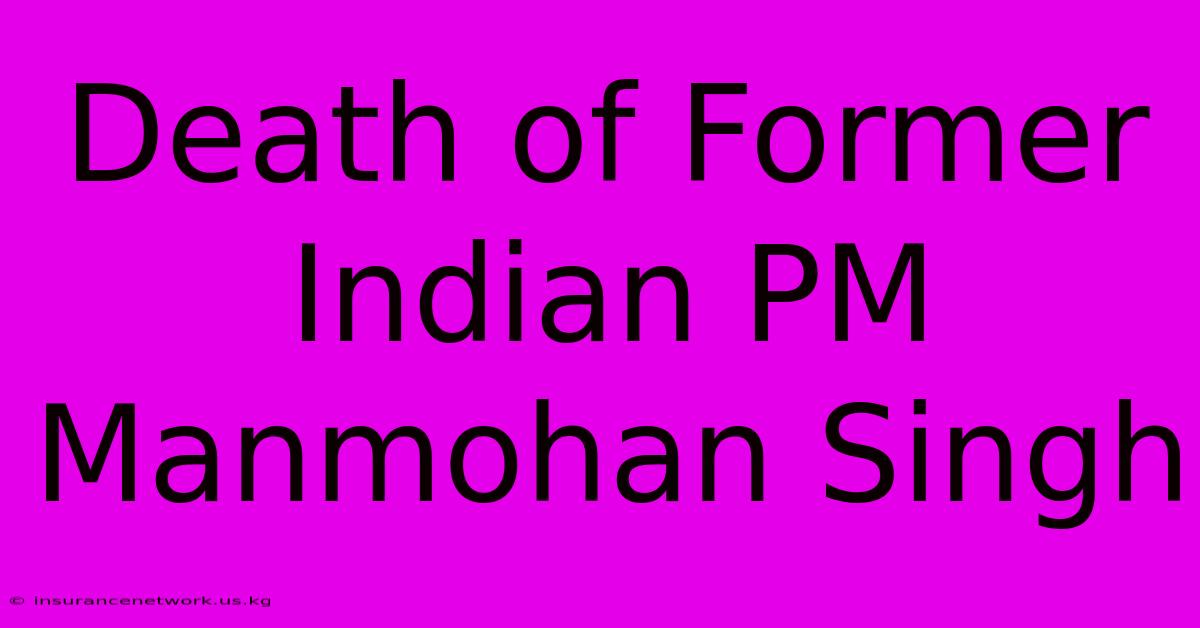Death Of Former Indian PM Manmohan Singh

Discover more detailed and exciting information on our website. Click the link below to start your adventure: Visit Best Website insurancenetwork.us.kg. Don't miss out!
Table of Contents
The Passing of Dr. Manmohan Singh: Remembering India's Quiet Reformer
The passing of former Indian Prime Minister Dr. Manmohan Singh marked the end of an era. More than just a politician, Dr. Singh was a respected economist who profoundly shaped India's trajectory in the 21st century. His legacy, characterized by quiet competence and a focus on economic liberalization, continues to be debated and analyzed. This article will explore the life and times of this influential figure, examining his contributions and the impact of his tenure.
A Life Dedicated to Service
Born in 1932, Dr. Manmohan Singh's early life was marked by academic excellence. He earned a PhD in Economics from Oxford University and quickly established himself as a leading expert in his field. His career included prestigious positions at the University of Cambridge and the Reserve Bank of India, laying the groundwork for his later political career.
The Architect of Economic Reforms
Dr. Singh's tenure as Prime Minister from 2004 to 2014 is largely defined by his pivotal role in further opening up the Indian economy. Building on the reforms initiated in the 1990s, he steered India towards greater integration with the global market. This period witnessed significant growth, lifting millions out of poverty and solidifying India's position on the world stage. His emphasis on fiscal prudence and sustainable development left a lasting mark on India's economic policy.
Key Accomplishments and Policies
- Increased Foreign Direct Investment (FDI): Dr. Singh's government actively encouraged FDI, leading to substantial growth in various sectors.
- Infrastructure Development: Significant investments were made in infrastructure projects, improving connectivity and boosting economic activity.
- Rural Development Initiatives: Programs aimed at rural development and poverty reduction were implemented, although their effectiveness remains a topic of ongoing discussion.
- India's Nuclear Deal with the US: A landmark achievement, this deal improved India's global standing and access to nuclear technology.
A Legacy of Quiet Diplomacy
While known for his economic expertise, Dr. Singh also pursued a policy of quiet diplomacy on the international stage. He skillfully navigated complex geopolitical issues, fostering strong relationships with numerous countries. His calm demeanor and measured approach often contrasted sharply with the more assertive styles of other political leaders.
Challenges and Criticisms
Despite his significant accomplishments, Dr. Singh's tenure was not without its challenges and criticisms. Accusations of corruption, particularly during the 2G spectrum scandal, tarnished his image. Furthermore, concerns about inequality and the uneven distribution of economic benefits persisted throughout his time in office. These issues continue to be points of debate and discussion regarding his legacy.
Conclusion: A Complex Legacy
Dr. Manmohan Singh's passing marks the end of a significant chapter in Indian history. His contributions to India's economic development are undeniable. However, a balanced assessment requires considering both the successes and shortcomings of his time in office. The legacy of Dr. Manmohan Singh remains a complex and multifaceted one, open to continued analysis and interpretation by historians and political scientists alike. His quiet leadership and dedication to service will undoubtedly be remembered and studied for generations to come. The impact of his policies will continue to shape India's destiny for years to come.

Thank you for visiting our website wich cover about Death Of Former Indian PM Manmohan Singh. We hope the information provided has been useful to you. Feel free to contact us if you have any questions or need further assistance. See you next time and dont miss to bookmark.
Featured Posts
-
Stealth Jet Chinas Surprise Debut
Dec 27, 2024
-
Bridgewater Signs With Detroit Lions
Dec 27, 2024
-
Chinas New Combat Aircraft Takes Flight
Dec 27, 2024
-
Teddy Bridgewaters Lions Return
Dec 27, 2024
-
Premier League Chelsea 1 2 Fulham Review
Dec 27, 2024
